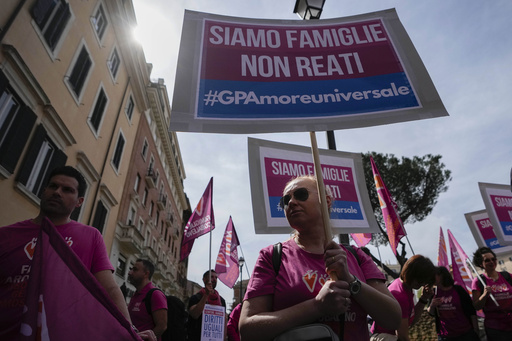
ROME — On Wednesday, Italy enacted a law criminalizing citizens who seek surrogacy services abroad, sparking criticism from various groups who have labeled the decision as “medieval” and discriminatory toward same-sex couples.
The new legislation, which builds upon a surrogacy prohibition that has been in effect since 2004, was spearheaded by Premier Giorgia Meloni’s far-right Brothers of Italy party alongside its conservative ally, the League. They argue that the ruling is meant to safeguard women’s dignity.
Following a lengthy debate lasting seven hours, the Senate passed the bill with a vote of 84 in favor and 58 against, marking the final legislative hurdle after the Lower House had approved it last year.
Under this new law, Italians who pursue surrogacy arrangements in countries where the practice is permitted, such as the United States or Canada, may face penalties of up to two years imprisonment, as well as potential fines reaching 1 million euros (approximately $1.1 million).
While the ban is ostensibly applicable to all couples, advocates for same-sex parenting argue that LGBTQ+ families are disproportionately impacted in a nation grappling with historically low birthrates and where adoption is exclusively available to heterosexual couples.
In addition to the surrogacy ban, same-sex marriages face prohibition in Italy, compelling LGBTQ+ individuals to struggle for legal parental rights for non-biological parents.
A demonstration was held outside the Senate by lawmakers and LGBTQ+ activists opposing the law, with some carrying signs declaring: “Parents, not criminals.”
Opposition lawmaker Riccardo Magi articulated the concerns during the march, stating, “When protectionism prevails, a social phenomenon is not erased; it is simply pushed into shadows where the law cannot reach.” He added that this could lead to increased risks of exploitation and violations of rights.
Cristiano Giraldi, a father of two who were born via surrogacy in the U.S., expressed his dismay, stating, “We are very saddened because Italy has once again missed an opportunity to align with what is expected from countries in Europe and beyond.”
The Catholic Church has been a staunch opponent of surrogacy both in Italy and internationally, with Pope Francis advocating for a universal ban and denouncing the perceived “commercialization” of pregnancy.
Nevertheless, the Vatican’s doctrine office has clarified that same-sex parents who engage in surrogacy are still permitted to have their children baptized.
While commercial surrogacy contracts are prevalent in the U.S. with various protections in place for mothers, such arrangements remain prohibited in several parts of Europe, including Spain and Italy.
